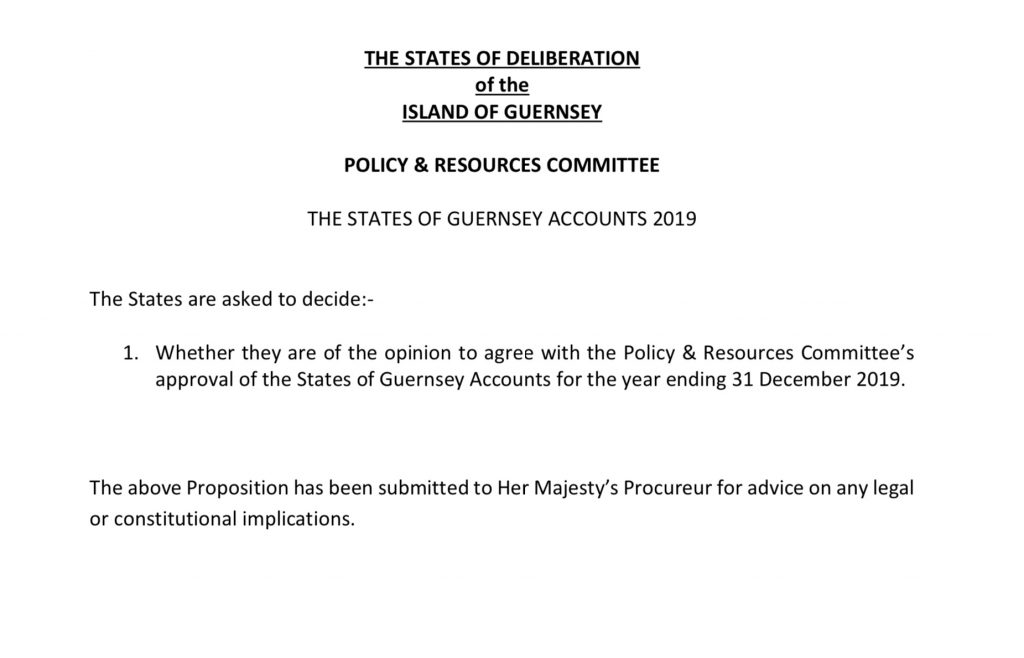Were it not for the pandemic this year, the annual accounts for our government would, as in the past, warrant some sharp debate. Instead, the virus and its aftermath mean that when our deputies discuss the position, the evidence before them will seem to be of mainly historic interest. The detail suggests otherwise.
The official narrative is clear. To quote Deputy Gavin St Pier, the island’s senior politician, the accounts show that years of financial discipline improved our position ahead of the pandemic. A budget surplus, substantial reserves, modest borrowing and a good credit rating all meant the island was well placed to deal with the impact of the virus on the public finances, he said. But “the financial position has changed dramatically and the Accounts don’t reflect where we are now.”
The precise detail of where we are now is still emerging, and must await the publication of various bits of data, in particular about unemployment, outflows of benefits and grants and inflows of tax revenues. Much of this will come long after action has been decided and implemented under the proposed “Revive and Thrive” economic recovery strategy.
But what can we usefully say about where we have come from? Quite a bit, it transpires, because – to the States’ credit – it is jam-packed with information, even leaving aside the old chestnut of continuing losses for States-owned airline Aurigny: £9.7m in 2019, £2m ahead of the expected figure, taking the accumulated total thus far to £15.2m – with more to come in 2020.
- Tax revenues have jumped. People who are employed or self-employed will quickly note that, as our leaders intended, the States’ income tax take has jumped, by no less than £17m, despite scarcely any increase in the numbers employed. This source now represents 65% of total tax revenues. Overall tax is up by £26m, to £538m.
- Public sector staff costs are still rising. Some £247m was spent on staff, up 7% and equivalent to 51.5% of recurrent spending. Almost 90% of the total went on establishment and public service staff, medical staff and teachers. A total of 325 senior staff each cost the exchequer £80,000 pa or more, up 27. The revenue surplus for the year finished little different from the previous year.
- Strong financial markets lifted the overall surplus. At £105m, the net surplus for the year was well ahead of the previous year’s £16m deficit. The big contributor, at £86m, was “investment returns” – that is, gains made through investing the island’s reserves (including the still-unused portion of the 30-year bond issue back in 2014). Such dependence on the kindness of markets is a vulnerability, but returns remain ahead of benchmark (RPI + 4%).
- Island reserves now amount to £2.6bn. The Consolidated Investment Reserve is 11% higher than the year before at £2.35bn and includes the assets of the civil service superannuation fund and Social Security’s insurance schemes. Add in other non-current assets and the overall total is £2.6bn. Set against this should be the liabilities of the civil service fund, amounting to £1.5bn, and of the bond issue (£317m). Note, the long-term target for the Reserve’s size is 100% of GDP. Currently that figure is put at 41%.
- This still does not include any value for the portfolio of property and other assets owned by the States. While net assets of the States are now put at £757m, up 16%, this is almost certainly an under-estimate. What is more, despite a plan to manage States property more efficiently, the accounts show only two properties sold during the course of the year – Fort Richmond (£0.9m), a genuine sale, and the transfer of land from which Guernsey Dairy operates to the Dairy’s balance sheet at a cost of £1m, partially funded by £750,000 from the bond issue proceeds. If that seems convoluted, it remains a source of surprise and concern that, outside the States trading assets, there is no reliable valuation of the States property portfolio and so little rationalisation.
- Uncertainty also surrounds the funding of the civil service pension scheme. In formal accounting terms it is 58.6% funded, down from 59.9% the previous year. In actuarial terms, it is 93.5% funded, but this healthier assessment is based on critical assumptions for future interest rates which independent analysts believe flatters the position. Social Security’s insurance schemes are of a “pay as you go” nature, but are periodically subject to actuarial review, with the same dependence on interest rate assumptions.
- Other accounting quirks persist. In the long Guernsey tradition of making capital expenditures from savings already built-up, all capital spending is still treated as cash spending and written off in the year it is spent – despite the fact that, by definition, it is used to create an asset with a measurable value. This outmoded approach ranks in accounting importance with the decision not to value States property holdings.
- And still no “true and fair” opinion. Although the accounts are audited, the auditor can only give an opinion that they are in line with the accounting policies of the States. Likewise, the intention to adopt International Public Sector Accounting Standards, though still intact, shows little sign of actually happening. As in the past, we are told that because of the “substantial resource implications required” it will be “transitioned to over a number of years.”
*
Plenty of other information is contained in the Accounts to satisfy the geekiest number-crunchers amongst us: how the proceeds of the bond issue have so far been spent; how the States Trading Supervisory Board, States Works and Ports are performing; how funds are over-complicatedly tucked away, or moved around here and there; how well-remunerated senior civil servants are; and so forth.
Now we must look forward, to a full-blooded assessment of where we are with the States finances. That ought to come with the budget later this year, presumably with a new assembly if an election finally goes ahead. We shall see serious changes on the tax and spending fronts given the support provided over recent months to businesses and individuals, and on the so-called balance sheet with the proposed additional borrowing of £550m.
In this context it is a moot question whether we can go on with the same approach as before to the States accounts. As with the comprehensive micro-economic statistics which Guernsey should also have, it is incomprehensible that cost is a factor preventing our leaders from understanding as best and as soon as possible the signposts required for the journey we are on, not to mention our destination.
This is especially true now that the pandemic, in the words of Deputy St Pier, has “trashed” the public finances. And all the more pertinent given that the good intentions of the “Revive and Thrive” strategy must still be turned into hard-nosed decisions.







